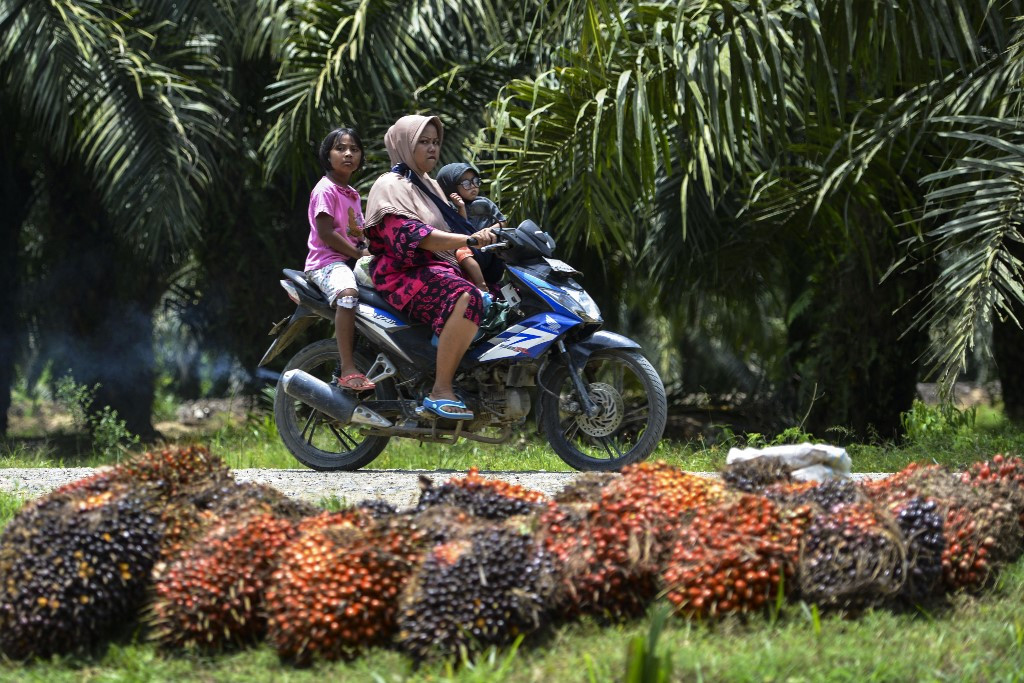Popular Reads
Top Results
Can't find what you're looking for?
View all search resultsPopular Reads
Top Results
Can't find what you're looking for?
View all search resultsGraft believed rife in oil palm sector
Lack of transparency makes industry ‘fertile ground’ for corruption, tax evasion.
Change text size
Gift Premium Articles
to Anyone
C
ivil groups are calling for more transparency in the governance of the oil palm sector, saying that Indonesia could still maximize its revenue from the sector as research has calculated substantial potential state losses from the sector due to alleged tax evasion.
Transparency International Indonesia researcher Bellicia Angelica said that as oil palm continued to thrive as one of Indonesia’s top export commodities, the lack of integrated monitoring efforts by relevant stakeholders had left the sector vulnerable to corruption.
“There is no integrated palm oil management design among different ministries, [government] institutions and local governments,” said Bellicia in a discussion on Tuesday. “This could make the oil palm [sector] a fertile ground for corruption, particularly in the process of obtaining business permits.”
She went on to add that the sector had also been marred by tax-evasion issues, citing a recent collaborative study conducted by civil group Auriga Nusantara along with news outlets Tempo, Mongabay Indonesia and Betahita, that estimated potential state losses of Rp 22.8 trillion (US$1.5 billion) annually due to alleged tax evasion in the industry.
The figure was calculated by comparing the estimated potential revenues from corporate income tax, property tax (PBB) and value added tax (PPN) with the realized tax collection from the oil palm sector in the country between 2016 and 2020.
The potential loss in tax revenue stood in stark contrast with the current industry landscape, where exports of crude palm oil (CPO) and its derivative products have become a significant element of Indonesia’s trade, Bellicia added.
According to data from the Indonesian Palm Oil Association (GAPKI), Indonesia exported 28.89 million tons of palm oil products, including CPO, crude biodiesel and oleochemical products, between January and October 2021. The figure represented a 6.1 percent increase compared with the same period in 2020.
Bellicia said data transparency was important to reduce the potential state losses from the oil palm sector and called on the government to improve transparency and accountability in the sector.
“There needs to be a policy to improve transparency among stakeholders, particularly in monitoring and law enforcement, which are related to corruption and tax evasion,” said Bellicia. “Tax evasion and the lack of clarity on the disclosure of beneficial owners of [palm oil] corporations are among the issues that stakeholders [need to address].”
Auriga Nusantara researcher Ramada Febrian said that while the government’s move to streamline business permits in several sectors, including the oil palm sector, through the Online Single Submission (OSS) was welcome, the government could do more to improve transparency in the oil palm sector.
“The existing systems were designed with the private sector in mind instead of the wider public. So further transparency is still needed,” Ramada said.
He also said that the government needed to come up with credible policies regarding palm oil as well as encouraging a healthy investment environment that benefits not just big corporations but also smallholders.
Separately, Corruption Eradication Commission (KPK) prevention division acting spokesperson Ipi Maryati Kuding said the commission had taken steps to prevent corruption and state losses in the oil palm sector.
She said that the KPK had encouraged ministries and agencies to come up with graft-prevention programs in the sector, which had resulted in policies intended to improve the sector’s governance, such as the One Map Policy, which addresses issues of overlapping land claims.
She also said that the KPK had signed a memorandum of understanding with Finance Ministry’s Directorate General of Taxation in 2020 to improve tax collection in the oil palm sector and encourage sustainable practices in plantations, with a pilot project in Riau province.
Ipi also pointed out that law enforcement was important for corruption-prevention efforts in the natural resources sector, including in oil palm plantations, adding that the KPK and 11 ministries and other government institutions had signed a pact in 2019 that outlined their commitment to improving law enforcement capacities to tackle corruption in the natural resources sector.
“We hope that through these programs we can increase the effectiveness of law enforcement in the natural resources sector, as well as discouraging corruption,” Ipi said.










